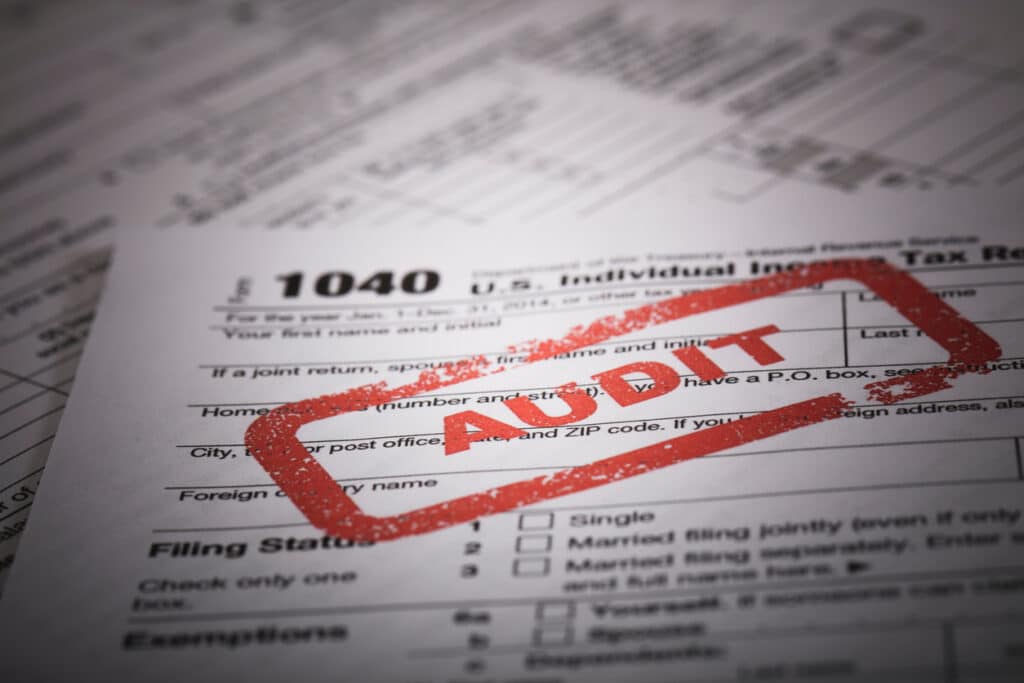How Far Back Can the IRS Audit You?

- How Far Back Can the IRS Audit?
- What Is an Audit?
- Common Triggers for an IRS Audit
- What Do I Need to Provide in an Audit?
- How Long Does an IRS Tax Audit Take?
- How Is an Audit Concluded?
- Agreeing with the Results of an Audit
- Disagreeing with the Results of an Audit
- What Is a Tax Levy?
- How Many Times Can You Be Audited by the IRS?
- Who Can Help with an Audit?
- How to Avoid an Audit
- Protect Yourself from an Audit with Greenback
Errors or discrepancies in your tax history can lead to an audit. But how far back can the IRS audit? Here’s what you need to know.
Key Takeaways
- The IRS can audit taxpayers up to three years back, but this can extend to six years for substantial errors.
- Common triggers for an audit include income discrepancies, excessive deductions, and reporting losses on a business year after year.
- An IRS tax audit can last from a few months to over a year, depending on the complexity of the issues involved.
- If you disagree with the result of an audit, you can request a meeting with an IRS manager or even file an appeal.
How Far Back Can the IRS Audit?
The IRS has up to three years to audit a tax return, which means they can scrutinize your filings up to three years after you’ve submitted them (or two years from the date you paid the tax, whichever is later).
However, if there is a substantial error, that statute of limitations extends to six years. (In this case, a “substantial error” means underreporting more than 25% of your gross income.) And in cases of fraud or failure to file, there is no statute of limitations. The IRS can audit an unfiled or fraudulent tax return at any time.
If you discover an error in a previous tax return, don’t wait for an audit to fix it. Proactively amending your return can help you avoid penalties and demonstrate your good faith to the IRS.
What Is an Audit?
An audit is essentially the IRS double-checking your numbers to ensure that the tax information you’ve provided is accurate. Think of it as the IRS reviewing your taxes to make sure everything adds up. This helps ensure that taxpayers haven’t made a mistake or filed a fraudulent return.
Common Triggers for an IRS Audit
Not all audits are random. Certain activities show up as red flags for the IRS, increasing your chances of being audited. Here are eleven common triggers.
Income Discrepancies
The IRS has sophisticated programs that compare the income reported by taxpayers with the information reported by employers, banks, and other entities. If the income you report doesn’t match the information the IRS has on hand, it might prompt an audit.
Always report every source of income, including:
- Employee wages
- Self-employment income
- Freelance payments
- Investment returns
- Rental income
…and any other earnings that are taxable under US law.
High Income
Taxpayers with a high income are more likely to be audited than those with an income closer to average. If you are a high earner, consider taking extra care when reporting your income to avoid any errors. (And above all, never attempt to hide the true scope of your income. That will only make matters worse.)
Large Charitable Donations
Charitable donations are always great, but making donations that seem large when compared to your income can raise questions. When making donations, always be sure to keep thorough records and receipts on hand.

Tax Deductions
There’s nothing wrong with claiming all tax deductions and credits available to you. However, the IRS is prone to double-checking records to make sure taxpayers are truly eligible for the tax benefits they claim. Be sure to keep supporting documents available in case the IRS asks you to justify your claim.
Significant Changes in Income
Large fluctuations in income from year to year might raise questions. In the eyes of the IRS, dramatic changes in income could indicate unreported income, the omission of certain financial activities, or an error in the reporting of earnings. However, there are plenty of legitimate reasons your income might fluctuate, including:
- Job changes
- Large business contracts
- Sale or purchase of assets
- Inheritance
Nevertheless, if your income changes noticeably, be prepared to explain the change.
Consistent Business Losses
Continually reporting losses on a business year after year can draw the IRS’s attention. When a business consistently reports losses, the IRS may wonder if the company is genuinely aimed at making a profit or if it’s being used as a vehicle to generate tax deductions. It’s crucial to maintain detailed records of your business activities, expenses, and income to substantiate your filings and demonstrate your intent to operate a profitable business.
Foreign Bank Accounts
If the total value of one or more foreign financial accounts exceeds $10,000 at any time during the calendar year, you must file a Foreign Bank Account Report (FBAR). You may also have to file a FATCA report depending on your filing status and where you live. Failing to accurately report your foreign financial accounts when required can quickly trigger an audit.
Cash Transactions
It’s easy for cash transactions to fly under the IRS’ radar. Because of this, they always pay special attention to cash transactions, especially when large amounts of cash are involved. If you use cash regularly in your business, the IRS may have questions. This is a common concern for restaurants, bars, retail establishments, and other businesses that regularly receive payments in cash.
Rental Losses
The IRS considers it a red flag when taxpayers claim large rental losses, especially if they cannot adequately prove their active involvement in the property’s management, or if they don’t qualify under the real estate professional guidelines. Keeping detailed records of your involvement in rental activities can be crucial for avoiding a potential audit.
Claiming 100% Business Use of a Vehicle
Claiming a vehicle as being used 100% for business purposes is a significant red flag for the IRS, mainly because it’s rare for a vehicle to be used exclusively for business without any personal trips. To substantiate such a claim, it’s crucial to maintain meticulous records, including a detailed mileage log that documents the date, mileage, and purpose of each trip.
If the IRS contacts you with questions or requests for more information, respond promptly and thoroughly. Delaying or ignoring IRS communications can escalate the situation.
What Do I Need to Provide in an Audit?
Be ready to show documentation for everything you’ve claimed on your taxes, including:
- Receipts
- Bills
- Employment records
- Business records
- Loan agreements
- Check ledger
- Bank account statements
…and anything else that can prove your claims are accurate.
How Long Does an IRS Tax Audit Take?
The duration of an audit can vary. Simple audits can take a few months, while more complex ones might last over a year. It depends on the audit’s complexity, the availability of your documents — and how quickly you respond to IRS requests.
How Is an Audit Concluded?
An audit concludes when the IRS has reviewed your documentation and determined whether your tax return is accurate. They’ll then issue their findings, which can be agreed upon or contested. Always ask for a closing letter from the IRS which states that the audit has concluded.
Agreeing with the Results of an Audit
If you agree with the results of an IRS audit, you’ll simply adjust your tax return, pay any additional taxes and penalties owed, or receive a refund if applicable. This is a straightforward process.
Disagreeing with the Results of an Audit
Disagreeing with an IRS audit can be a bit more complex. First, you can arrange a conference with an IRS manager. This will give you an opportunity to explain your concerns and request a change in the IRS’s decision.
Failing that, you can file an appeal. In extreme cases, you can even take your case to court. There are avenues available to ensure you’re treated fairly. If you’re concerned by your audit findings, consult a qualified accountant or attorney to discuss your options.
Know your rights! Familiarize yourself with the IRS’s Taxpayer Bill of Rights. Understanding your rights in an audit situation can help you navigate the process more confidently and ensure you’re treated fairly.
What Is a Tax Levy?
A tax levy means that the IRS can legally seize your property to cover unpaid taxes. This is a serious action that may be taken after multiple notices and opportunities to pay have been ignored.
How Many Times Can You Be Audited by the IRS?
There’s no limit to how many times the IRS can audit you. The good news is that being audited once doesn’t necessarily mean you’ll ever be audited again. Each tax year stands on its own, and if the IRS has no new concerns, they’ll leave you in peace.
Who Can Help with an Audit?
Tax professionals, such as CPAs, tax attorneys, or enrolled agents, can provide expert advice and representation. They know the ins and outs of tax law and can navigate the audit process smoothly. At Greenback Expat Tax Services, our CPAs and IRS Enrolled Agents have helped numerous Americans navigate the complexities of being audited.
How to Avoid an Audit
There are steps you can take to help minimize the chances of an audit, such as:
- Ensuring all your tax returns are accurate
- Reporting all income
- Making sure you are eligible for any deductions and credits before claiming them
- Maintaining impeccable records
No matter how careful you are, audits can still happen at random. However, this is rare, and doing your best to avoid red flags will likely protect you from an audit notice.
Protect Yourself from an Audit with Greenback
We hope this guide has helped answer the question of how far back the IRS can audit.
If you’re facing an audit or want to ensure you’re doing everything right to avoid one, Greenback is here to help. We can provide you with the guidance, support, and peace of mind you need, whether you’re dealing with the IRS directly or simply planning your tax strategy.
If you’re ready to be matched with a Greenback accountant, click the get started button below. For general questions on expat taxes or working with Greenback, contact our Customer Champions.




